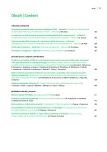-
Medical journals
- Career
Clinical study FOURIER
Authors: Ján Murín
Authors‘ workplace: I. interná klinika LF UK a UNB, Nemocnica Staré mesto, Bratislava, Slovenská republika
Published in: Vnitř Lék 2017; 63(6): 411-414
Category: Reviews
Overview
A new group of hypolipidemic substances, i.e. PCSK9 protein inhibitors, is now coming into use in clinical practice, to what extent a high residual cardiovascular risk remains also in patients treated with statins. The FOURIER study (Further cardiovascular OUtcomes Research with PCSK9 Inhibition subjects with Elevated Risk) is the first “event” study which has shown that evolocumab (PCSK9 antibody) further significantly reduces serum LDL cholesterol and subsequently also cardiovascular morbidity and mortality: (a) composite primary goal (cardiovascular mortality, incidence of heart attacks, strokes, hospitalizations for unstable angina, coronary revascularization) by 15 % (p < 0.001), (b) secondary goal (cardiovascular mortality, incidence of heart attacks, strokes) by 20 % (p < 0.001), (c) the treatment effect increased with length of treatment, and (d) the treatment was safe. The study has therefore confirmed that further reduction of serum LDL cholesterol by means of evolocumab significantly reduces incidence of cardiovascular events in patients with elevated risk. This treatment is primarily needed for individuals with elevated cardiovascular risk.
Key words:
atherosclerosis – evolocumab – cardiovascular diseases – LDL cholesterol – PCSK9 inhibitors
Sources
1. Giugliano RP, Sabatine MS. Are PCSK9 inhibitors the next breakthrough in the cardiovascular field? J Am Coll Cardiol 2015; 65(24): 2636–2651. Dostupné z DOI: <http://dx.doi.org/10.1016/j.jacc.2015.05.006>.
2. Blom DJ, Hala T, Bolognese M et al. A 52-week placebo-controlled trial of evolocumab in hyperlipidemia. N Engl J Med 2014; 370(19): 1809–1819. Dostupné z DOI: <http://dx.doi.org/10.1056/NEJMoa1316222>.
3. Robinson JG, Nedergaard BS, Rogers WJ et al. Effect of evolocumab or ezetimibe added to moderate - or high-intensity statin therapy on LDL-C lowering in patients with hypercholesterolemia: the LAPLACE-2 randomized clinical trial. JAMA 2014; 311(18): 1870–1882. Dostupné z DOI: <http://dx.doi.org/10.1001/jama.2014.4030>.
4. Cohen JC, Boerwinkle E, Mosley TH Jr et al. Sequence variations in PCSK9, low LDL, and protection against coronary heart disease. N Engl J Med 2006; 354(12): 1264–1272. . Dostupné z DOI: <http://dx.doi.org/10.1056/NEJMoa054013>.
5. Karhiresan S. [Myocardial Infarction Genetics Consortium]. A PCSK9 missense variant associated with a reduced risk of early-onset myocardial infarction. N Engl J Med 2008; 358(21): 2299–2300. Dostupné z DOI: <http://dx.doi.org/10.1056/NEJMc0707445>
6. Sabatine MS, Giugliano RP, Wiviott SD et al. Efficacy and safety of evolocumab in reducing lipids and cardiovascular events. N Engl J Med 2015; 372(16): 1500–1509. Dostupné z DOI: <http://dx.doi.org/10.1056/NEJMoa1500858>.
7. Robinson JG, Farnier M, Krempf M et al. [ODYSSEY LONG TERM Investigators]. Efficacy and safety of alirocumab in reducing lipids and cardiovascular events. N Engl J Med 2015; 372(16): 1489–1499. Dostupné z DOI: <http://dx.doi.org/10.1056/NEJMoa1501031>.
8. Sabatine MS, Giugliano RP, Keech AC et al. Evolocumab and clinical outcomes in patients with cardiovascular disease. N Engl J Med 2017; 376(18):1713–1722. Dostupné z DOI: <http://dx.doi.org/10.1056/NEJMoa1615664>.
9. Cannon CP, Braunwald E, McCabe Ch et al. Intensive versus moderate lipid lowering with statins after acute coronary syndromes. N Engl J Med 2004; 350(15): 1495–1504. Erratum in N Engl J Med. 2006; 354(7): 778. Dostupné z DOI: <http://dx.doi.org/10.1056/NEJMoa040583>.
10. LaRosa JC, Grundy SM, Waters DD et al. Intensive lipid lowering with atorvastatin in patients with stable coronary disease. N Engl J Med 2005; 352(14): 1425–1435. Dostupné z DOI: <http://dx.doi.org/10.1056/NEJMoa050461>.
11. Cannon CP, Blazing MA, Giugliano RP et al. Ezetimibe added to statin therapy after acute coronary syndromes. N Engl J Med 2015; 372(25): 2387–2397. Dostupné z DOI: <http://dx.doi.org/10.1056/NEJMoa1410489>.
12. Nicholls SJ, Puri R, Anderson T et al. Effect of evolocumab on progression of coronary disease in statin-treated patients: the GLAGOV randomized clinical trial. JAMA 2016; 316(22): 2373–2384. Dostupné z DOI: <http://dx.doi.org/10.1001/jama.2016.16951>.
13. Loyd-Jones DM, Morris PB, Ballantyne CM et al. 2016 ACC expert consensus decision pathway on the role of nonstatin therapies for LDL-cholesterol lowering in the management of atherosclerotic cardiovascular disease risk: a report of the American College of Cardiology Task Force on Clinical Expert Consensus Documents. J Am Coll Cardiol 2016; 68(1): 92–125. Dostupné z DOI: <http://dx.doi.org/10.1016/j.jacc.2016.03.519>.
14. Landmesser U, Chapman JM, Farnier M et al. European Society of Cardiology/European Atherosclerosis Society Task Force consensus statement on proprotein convertase subtilisin/kexin type 9 inhibitors: practical guidance for use in patients at very high cardiovascular risk. Eur Heart J 2016. pii: ehw480. Dostupné z DOI: <http://dx.doi.org/10.1093/eurheartj/ehw480>.
15. Baigent C, Blackwell L, Emberson J et al. [Cholesterol Treatment Trialists’ Collaboration]. Efficacy and safety of more intensive lowering of LDL cholesterol: a meta-analysis of data from 170 000 participants in 26 randomised trials. Lancet 2010; 376(9753): 1670–1681. Dostupné z DOI: <http://dx.doi.org/10.1016/S0140–6736(10)61350–5>.
16. [Scandinavian Simvastatin Survival Study Group]. Randomised trial of cholesterol lowering in 4444 patients with coronary heart disease: the Scandinavian Simvastatin Survival Study (4S). Lancet 1994; 344(8934): 1383–1389. Dostupné z DOI: <http://dx.doi.org/10.1016/S0140–6736(94)90566–5>.
17. Silverman MG, Ference BA, Im K et al. Association between lowering LDL-C and cardiovascular risk reduction among different therapeutic review and meta-analysis. JAMA 2016; 316(12): 1289–1297. Dostupné z DOI: <http://dx.doi.org/10.1001/jama.2016.13985>.
Labels
Diabetology Endocrinology Internal medicine
Article was published inInternal Medicine

2017 Issue 6-
All articles in this issue
- Risk factors for cardiovascular diseases in the descendants of patients after early myocardial infarction
- “Snags” connected with establishing the vitamin D
- Clinical study FOURIER
- Primary testicular lymphoma
- Rivaroxaban in high-risk patients
- Two perspectives on venous thromboembolism in oncology
- Insulin pump in type 2 diabetes: B-cell focused treatment
- Predictors of quality of life in Czech female breast cancer survivors following treatment with special interest to coping strategies
- Internal Medicine
- Journal archive
- Current issue
- Online only
- About the journal
Most read in this issue- Primary testicular lymphoma
- Insulin pump in type 2 diabetes: B-cell focused treatment
- “Snags” connected with establishing the vitamin D
- Two perspectives on venous thromboembolism in oncology
Login#ADS_BOTTOM_SCRIPTS#Forgotten passwordEnter the email address that you registered with. We will send you instructions on how to set a new password.
- Career

